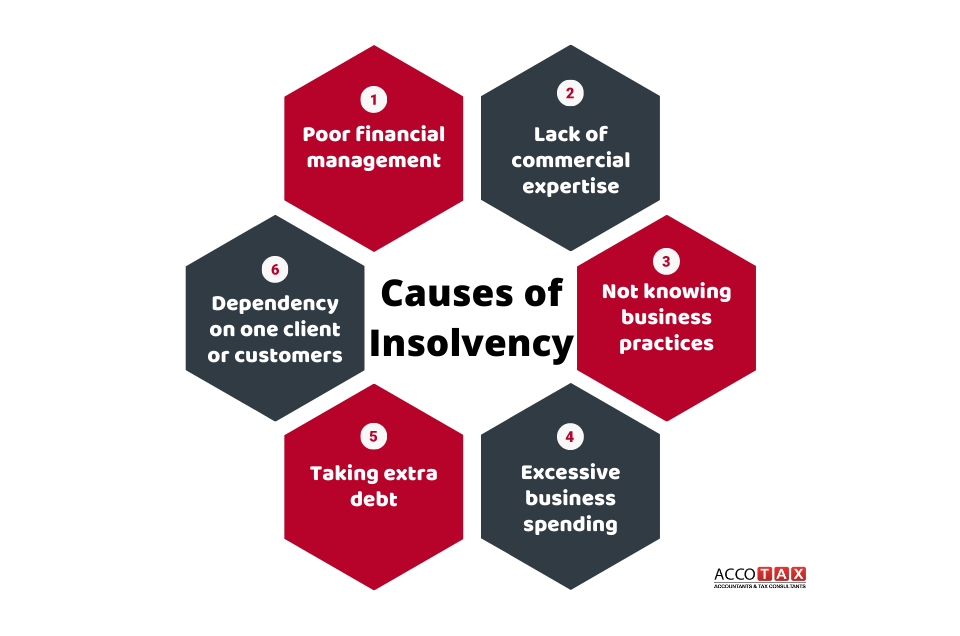Fascination About Insolvency Practitioner
Fascination About Insolvency Practitioner
Blog Article
What Does Insolvency Practitioner Mean?
Table of ContentsThe Best Strategy To Use For Insolvency PractitionerRumored Buzz on Insolvency PractitionerThe 7-Second Trick For Insolvency PractitionerThe Best Strategy To Use For Insolvency PractitionerThe smart Trick of Insolvency Practitioner That Nobody is DiscussingInsolvency Practitioner Can Be Fun For AnyoneSome Known Questions About Insolvency Practitioner.
Insolvency is when obligations are above the worth of the business, or when a borrower can not pay the debts they owe. A firm can end up being financially troubled as a result of a variety of circumstances that cause inadequate cash money flow. When faced with bankruptcy, a service or individual can contact financial institutions straight and restructure financial debts to pay them off.Service owners may get in touch with financial institutions directly and restructure financial obligations right into more workable installations. Financial institutions are commonly responsive to this approach because they want to be settled and prevent losses, even if the payment is on a delayed schedule.
The Greatest Guide To Insolvency Practitioner
The owner produces a proposal detailing just how the debt may be reorganized utilizing price reductions or various other prepare for support. The proposal reveals creditors just how business may generate adequate capital for lucrative operations while paying its debts. Generally, a forgiven debt might be considered income by the Irs (IRS).

Little Known Questions About Insolvency Practitioner.
When operations discontinue, so does the company's earnings (Insolvency Practitioner). Some business become insolvent due to the fact that their goods or solutions do not advance to fit consumers' altering demands.
Expenditures surpass revenues and bills remain overdue. Kinds of insolvency include cash-flow bankruptcy and balance-sheet insolvency. Cash-flow insolvency occurs when a firm has the assets to cover their financial debts but they remain in the wrong form, such as realty as opposed to liquid funds. Balance-sheet insolvency, on the various other hand, shows a lack of properties in any form to cover debts.
The internal revenue service states that an individual is financially troubled when the complete obligations exceed complete assets. A bankruptcy, on the other hand, is a real court order that shows just how an insolvent individual or organization will pay off their creditors, or exactly how they will certainly offer their possessions in order to make the repayments.
Insolvency Practitioner Fundamentals Explained

Comprehending the elements that can result in bankruptcy, such as overspending, can aid you prevent bankruptcy and its effects.
An Unbiased View of Insolvency Practitioner
It is well known that supervisors and policemans of corporations (and supervisors of restricted responsibility firms) owe fiduciary obligations to their organizations and their shareholders (or members). These fiduciary commitments are specified by state statutes and, though there are variants from state to state, they generally consist of an obligation of loyalty and a duty of treatment.
The task of treatment calls for supervisors and policemans to exercise persistance, to make enlightened choices, and to act in great belief to make sure that their activities remain in the most effective rate of interest of the firm. Though beyond the scope of this conversation, some states allow these duties to be restricted either by so see noting in the business records or following other requirements.
The 5-Minute Rule for Insolvency Practitioner
A lot of states specify insolvency in two means( 1) when a company's obligations come to be higher than the sum of its assets or (2) when the company becomes unable to pay its debts as they come to be dueand welcome both meanings (Insolvency Practitioner). The change in obligations takes place due to the fact that when a firm is bankrupt, there is no worth in the business past that owed to the company's lenders to ensure that the equity owners no much longer have a financial risk in the firm
Beware regarding providing shareholders special treatment at the expenditure of financial institutions (e.g., accrediting and funding a returns or a stock redemption). Take care regarding favoritism between courses of investors. Clear up initiatives to learn all the truths prior to taking a specific program of action; directors ought to genuinely think that any kind of choices made remain in the best passions of the corporation in its whole (i.e., decisions will certainly be examined in knowledge due to the result of such actions on the company).
In any kind of personal bankruptcy or insolvency proceeding, payments made to particular financial institutions at the cost of various other lenders can be clawed back, especially if there is some link in between the company and the creditor. Think about proposing at an annual shareholder conference (or any other meeting of shareholders) a resolution verifying that all previous business decisions and activities taken by the supervisors and policemans of the corporation were taken in good belief after an exercise of reasonable care.
The Ultimate Guide To Insolvency Practitioner
Completely reveal any type of individual or service partnerships with parties beyond of deals including the read the article corporation to stay clear of the appearance of a problem of rate of interest. In evaluating potential fund elevating transactions or a sale of possessions of the troubled company, understand that these deals might be inspected later on due to any type of subsequent expansion of directors' fiduciary duties to consist of check financial institutions.
Report this page